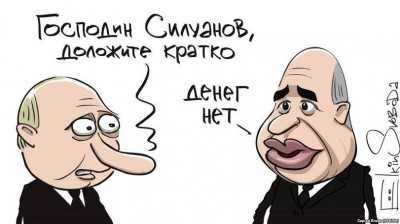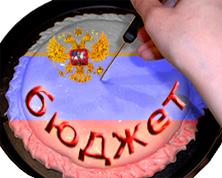
The Finance Ministry is working on measures that will stimulate citizens to purchase bonds (OFZ). Since such borrowing, in the opinion of the experts of the “Free press”, in the role of hardly any main source of financing the budget deficit for the next three years.
This explains the words of Deputy Finance Minister Alexei Moiseyev about the fact that the Ministry of Finance — as one of the options is considering the introduction of taxation of incomes of physical persons on deposits. The statement of the Deputy Minister, taken on October 26 during the lecture at the Financial University under the Russian government, caused heated discussion in the media. Himself Moses actually tried to refute it, but this is the case when the smoke without fire does not happen.
Recall: at the end of September it became known that the Ministry of Finance until the end of 2016 is going to release Federal loan bonds to the public. This was stated by the head of Department Anton Siluanov in Moscow financial forum. In his opinion, these bonds may be of interest to the Russians.
“I believe that in addition to the usual tools of keeping money they can invest in government bonds, which will be more profitable than deposits. Therefore, we are expanding the range of our tools”, said the Minister.
Siluanov added that the government of the Russian Federation in 2017 plans to take on the domestic market is about 3.5 times more than in 2016. “See that the market is ready for such volumes. We will be releasing some interesting tools for our investors”, — optimistically promised Siluanov.
However, far not the fact that people will rush to invest their savings in “cool tools”, even more profitable. Deposits in banks, unlike investment in the stock market, and insured by the state in the amount of 1.4 million rubles. Plus, with the coupons on the bonds may have to pay income tax. The abolition of this tax urged to think President Vladimir Putin. However, as noted Moiseev, the Ministry has not yet figured out how to exempt from tax the coupons.
In such a situation that citizens are invested in bonds, we need not only “carrot” in the form of 8-15% of annual income on FB, but the “stick” — the obvious disadvantage of deposits.
Representatives of the Ministry of Finance and Federal tax service (FNS), according to “Kommersant”, actually discussed during private meetings is the possibility of taxation of income on deposits — as a working idea.
Direct benefits to the Treasury, incidentally, from the measure a bit. According to preliminary estimates, the current level of investment of public funds in banks (23 trillion. rubles, including demand deposits) and return on deposits (according to the Central Bank — from 7.1% to 9.8% per annum, depending on the term of the Deposit) the budget may additionally obtain a maximum of 300 billion rubles.
But the main problem, again, is different: to change the rules of the game to force people to “shift” from deposits in the OFZ. “Considered as work in progress equalization of conditions through the “make everything worse” that is all the same to tax any part of the Deposit”, — said at the lecture of Moses.
In such a situation can do, the Ministry of Finance how much money is really to take on the domestic market?
— The idea of taxing deposits is purely a draft — said the head of “Finance and Economics” Institute of contemporary development Nikita Maslennikov. Your position, apparently, still speak for the Central Bank, which is now preparing proposals for the refusal to tax the coupons on bonds. The bill, I will remind, it is planned to submit to the state Duma in mid-2017.
All this is done in order to motivate private investors to invest in Russian securities. The global goal is using such mechanisms to form the securities market, and go finally from the current pension system individual pension capital.
However, the words of the Deputy Minister of Moses proves that our government are on a fork. They decided that for them, the main strategic line for the formation of massive investment behavior of citizens, or support the placement of OFZ, which is also strategic?
The fact that the situation with budget deficit in 2017-2019 is really complicated. According to calculations, the increase in the net debt of the Federal budget in this period will amount to 1 trillion. rubles per year. Now about 70% of the budget deficit is covered from the Reserve Fund. But the Fund is rapidly being depleted, and the government hopes to replace this source of domestic borrowing through government bonds.
“SP”: — If you impose income tax deposits, it will encourage citizens to invest in the BFL?
— The implementation of this idea raises many questions. It can be assumed that the measure would not apply to any contributions that are protected by state insurance — the size of which does not exceed 1.4 million. But another question arises — what will be the effect of this taxation?
The overall opinion of banking analysts, the actions of the Ministry of Finance can cause a serious outflow of deposits from banks up to 200 billion rubles a year. This suggests that not worth powder and shot. Because it is unclear where this money would then be directed.
Not the fact that people will invest in BFL. Bonds usually are not dealing with, qualified investors. This is usually large depositors, whose deposits hosts several million rubles. But they are absolutely easy to find alternative places for their money.
Yes, Federal loan bonds for investors is the bait. Just coupons on government bonds will not be subject to personal income tax. But the system of sales of these securities to individuals is very poorly built. The idea is that the sale of bonds to the public should deal only with the authorized banks, which enjoy the highest trust of citizens. Under this criterion, only two or three of the state Bank, with the mass sale of bonds they can is banal not to manage.
Finally, the banks themselves are beneficial to their customers has left the savings in the deposits. Therefore, at some time, banks can make Deposit rates more attractive, and thereby to block the flow of investors in the OFZ.
“SP”: — What means to really engage with BFL?
Now it is unclear how selling OFZs will be organized. On the one hand, the people that will push deposits in the OFZ market will have to be able to buy bonds. On the other, declared by the Ministry of Finance, the volume of OFZ show that they are a test.
Assessment of the volume of accommodation are very different, but if you take the bottom bar is not more than 20 million rubles in 2017. For the budget, it is clear that such funds — that drop into the sea. This suggests that the mass placement of OFZ — the prospect is not so close.
With the mass placement of OFZ has another problem. In this case, government and corporate securities are competitors. For example, for 2017-2019 the Cabinet will be able to place OFZ to 3 trillion. rubles to cover the budget deficit. But at the same time it would mean that exactly the same amount will decrease the volume of corporate placements.
The economy is a bad decision, as it significantly shifts the timing of the recovery of investment growth. This means, significant economic growth will not be exact.
A significant issue OFZ government to place unlikely, — says the Chairman of Russian economic society. SF Sharapova, Professor of international Finance (University) Valentin Katasonov. The main obstacle, in my opinion, there is no guarantee from the state that the citizen will not lose the money invested. Note that this guarantees for debt securities there is no country in the world — even on bonds that release of the Ministry of Finance of the respective countries.
In my opinion, for the Russian citizen of such a financial instrument less intelligible and less preferred than a Bank Deposit.
On the other hand, the situation with deposits in Russia is also rather tense. So, on foreign currency deposits, banks have cut interest rates to virtually zero. On ruble bets, at first glance, more serious — an average of almost 10% per annum. However, reputable banks are significantly lower. And understands: once the stakes are high — so the Bank is in a desperate situation.
In this situation, the introduction of a tax on income on deposits, would only provoke the population to a massive withdrawal of deposits. I think that’s why the banks will stand on its hind legs, and will do everything to block such a decision.
I think the budget from a tax on income from deposits’t win much either. And if the Ministry of Finance remembered the deposits of wealthy citizens, that is simpler and more intuitive for the option of closing the deficit. I mean the rejection of the flat income tax in favor of a progressive scale.
As for government bonds, I do not exclude that the government can go to a voluntary-forced placement of these securities. As we can see in today’s Russia, the authorities only talk about democracy, and the “tightening the screws” a lot stronger than it was even under the Bolsheviks…








